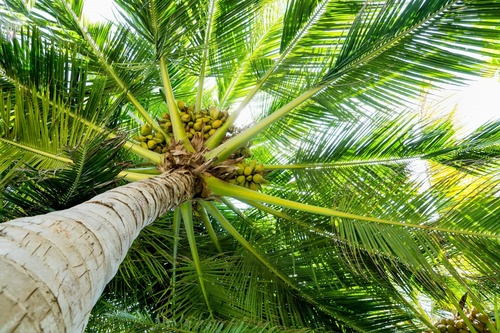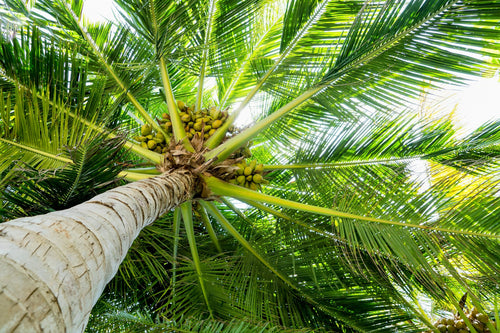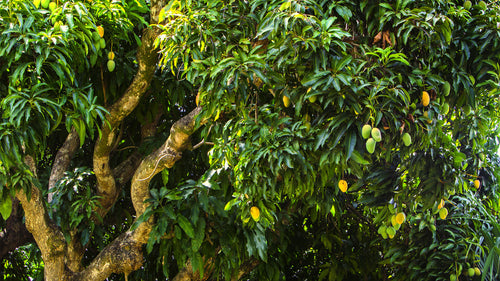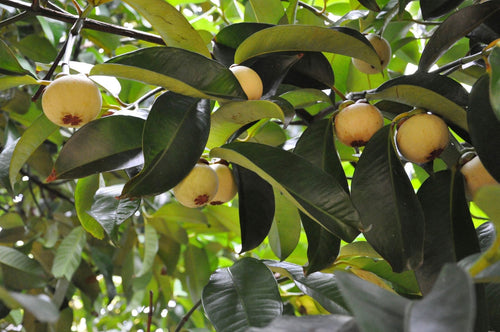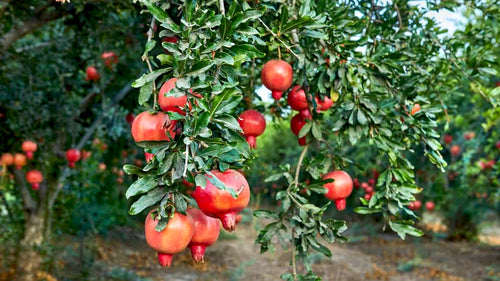Rakul & Jackky's Wedding Forest in Goa
As we embark on our new journey together, we want to celebrate our love in a way that reflects our values and leaves a lasting positive impact on the Read more
Plantation Site Gallery
Project Update 4






Project Update 3
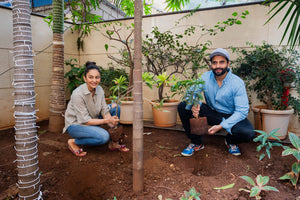
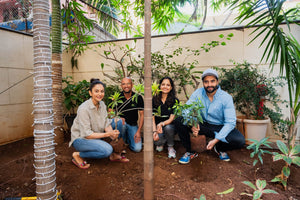
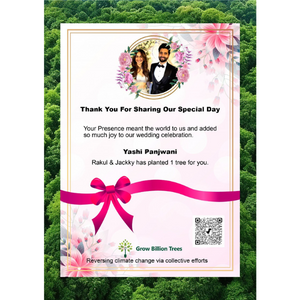
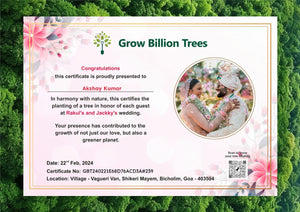
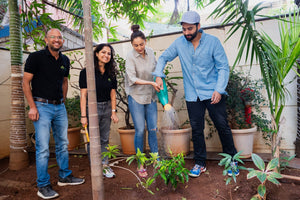

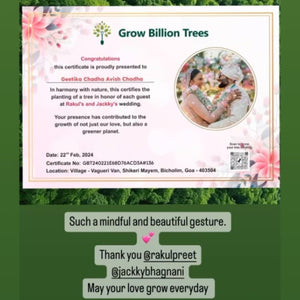

Project Update 2






Project Update 1




Digital Forest
Forest with 537 Trees planned
Want to plant Trees for Wedding now?
Plant a Tree @ 299Rakul & Jackky's Wedding Forest in Goa
As we embark on our new journey together, we want to celebrate our love in a way that reflects our values and leaves a lasting positive impact on the world. That's why we're thrilled to announce the creation of our very own wedding forest!
We've always been passionate about environmental sustainability, and we believe planting trees is a beautiful way to offset the carbon footprint of our wedding while creating a living legacy that grows alongside our love.
Join us in planting 537 trees, transforming an area in Goa into a thriving forest teeming with life. Each tree will not only neutralize 20KG of carbon dioxide, but also provide a haven for biodiversity and contribute to a healthier planet.
Imagine the magic: Picture a lush forest, rustling leaves whispering our love story, standing tall as a symbol of our commitment to each other and our shared future. We want you, our cherished loved ones, to be a part of this incredible journey!
By sharing this page using the hashtag #GrowWithRakulJackky, you can spread the love and inspire others to join us in creating a greener future.
Thank you for being a part of our special day and supporting our commitment to a sustainable future. Together, we can watch our love story blossom into a thriving forest, a testament to the joy, connection, and environmental consciousness we share.
With love and gratitude,
Rakul & Jackky
In a beautiful blend of love and sustainability, celebrity couple Rakul Preet Singh and Jackky Bhagnani partnered with Grow Billion Trees to create a Wedding Forest. This unique initiative goes beyond traditional celebrations—it's a living legacy that mirrors their shared values and inspires others to celebrate in ways that heal the planet.
As a token of appreciation for their guests' presence and support, Rakul and Jackky are providing each attendee with a Tree Certificate, a personalized greeting card, and a unique Non-Fungible Token (NFT) commemorating the tree planted in their honor. These thoughtful mementos serve as lasting reminders of the couple's commitment to sustainability and their guests' contribution to environmental conservation.
Rakul and Jackky have a special focus on sustainability and are dedicated to incorporating eco-friendly practices into their wedding celebrations. Through the Wedding Forest Initiative, they are setting an example for others in the industry and inspiring change towards a more sustainable future.
Their commitment extends beyond celebration, supporting both agroforestry and urban forestry initiatives that enrich rural livelihoods and restore green spaces—nurturing nature in both farmlands and cities.
Urban Project Planning & Execution
No. of trees: 100 Trees
Plantation Location: Maem, Bhatwadi, Goa 403504
Plantation Date: 21st February 2024
Name of Species: Kaju, Coconut, Lemon, Mango
Species Selection & Its Benefits:
The selection of tree species for Rakul and Jackky’s Wedding Forest was guided by both ecological significance and regional suitability. The chosen species—Kaju (Cashew), Coconut, Lemon, and Mango—not only thrive in Goa’s coastal climate but also offer a rich blend of environmental and socio-economic benefits. Cashew and Coconut are deeply rooted in the local agrarian culture, providing long-term economic value through their nuts and fruit, while also supporting coastal soil conservation. Lemon and Mango trees enhance biodiversity, attract pollinators, and yield seasonal fruits that benefit nearby communities nutritionally and economically. Collectively, these fruit-bearing species contribute to carbon sequestration, improve soil health, support wildlife habitats, and foster sustainable livelihoods—making the forest not just a symbol of love, but a living, giving ecosystem.
Beneficiaries Details (Urban Forest)
-
Target Population: Employees, stakeholders, and local community members of Goa
-
Age Group: All age groups focus on adults to seniors
-
Gender: Inclusive of all genders
-
Social & Economic Status: Open to all social and economic backgrounds, emphasising community involvement
Planting Methodology and Its Advantages
Urban Forestry: An urban forest is a network of trees, shrubs, and vegetation strategically planted in urban areas to enhance biodiversity, improve air quality, reduce the urban heat island effect, and provide green spaces for community well-being. It helps mitigate climate change by absorbing carbon dioxide, promotes mental health through accessible green areas, and supports local wildlife by creating habitats. Urban forests play a vital role in building resilient, sustainable cities that benefit both the environment and the people who live in them.
Advantages of Urban Forestry
-
Climate Regulation and Cooling Effect: Urban forests help mitigate the urban heat island effect by providing shade and cooling through transpiration, lowering temperatures in cities, reducing the need for air conditioning, and conserving energy.
-
Improved Air Quality: Trees absorb pollutants like carbon dioxide, nitrogen oxides, and particulate matter, leading to improved air quality and reducing the risk of respiratory illnesses in urban areas.
-
Stormwater Management and Flood Prevention: Urban forests improve the soil’s ability to absorb and retain water, reducing stormwater runoff, preventing flooding, and promoting groundwater recharge, thus helping manage water resources efficiently.
-
Soil Erosion Control: The deep root systems of trees prevent soil erosion, especially in areas with heavy rainfall or steep slopes, stabilising the land and reducing soil loss in urban environments.
-
Aesthetic and Recreational Value: The transformation of unused spaces into green zones adds aesthetic value to the area and provides employees and local communities with recreational spaces, making the workplace more enjoyable.
-
Enhanced Community Engagement and Well-being: Urban forests provide accessible green spaces where communities can engage in recreational activities, improving mental health, reducing stress, and fostering a sense of environmental stewardship among residents and employees.
-
Increased Property Value: Properties located near urban forests or green spaces tend to have higher market values, benefiting local property owners and increasing the overall appeal and livability of the area.
-
Noise Reduction: Urban forests act as natural sound barriers, reducing noise pollution and creating quieter, more peaceful surroundings.
Conclusion Elements
Impact
Direct Impact
| Parameters | Values | References |
| No. of Trees Planted | 100 | |
| Green Cover (Acres) | 1.75 acres | |
| Carbon Sequestration Potential (KG) | 20 |
Small to medium-sized trees can sequester around 10–48 kilograms (22–106 pounds) of CO₂ annually. https://growbilliontrees.com/blogs/knowledge/how-much-co2-can-one-tree-absorb |
| Carbon Sequestration by 100 mature trees ( Tons/year) | 2 Tons | No. of Trees x Carbon Sequestration by 1 mature trees per year |
| Carbon Credit Equivalent | 2 | One carbon credit is equivalent to one tonne of carbon dioxide or the equivalent amount of another greenhouse gas. |
| Carbon Footprint of an avg Indian Citizen (Tons/Year) | 1.8 | https://www.iea.org/countries/india/emissions |
| Offsets Annual Carbon Footprint of (Adults) | 1 | Carbon offset by 100 mature trees per year / Carbon Footprint of an avg Indian Citizen per year |
* This impact analysis is forward-looking (An urban-forest project matures in 3-5 years)
Indirect Impact
Community Impact
-
Improved Public Health: By improving air quality and reducing urban heat, the project indirectly contributes to better public health. The presence of green spaces encourages outdoor activities, which can reduce stress levels, promote mental well-being, and decrease the incidence of respiratory diseases.
-
Environmental Awareness: Involving communities in urban forestry raises awareness about environmental conservation and promotes sustainable practices in daily life.
-
Employee Morale: The initiative fostered a sense of pride and connection among employees, strengthening team bonds and their alignment with the company’s values.
-
Inspiration for Change: By showcasing the potential of urban forestry, the project has encouraged other organisations and local communities to undertake similar initiatives.
-
Cultural Shift: The initiative instilled a mindset of sustainability and environmental care among participants, creating advocates for green practices in their personal and professional lives.
Environmental Impact
-
Carbon Sequestration: The trees planted through Rakul & Jackky's urban forestry initiative absorb carbon dioxide, acting as carbon sinks and helping mitigate climate change by reducing greenhouse gas emissions.
-
Soil Health Improvement: The tree planting initiative enhances soil health by enriching it with organic matter, improving soil fertility and structure, which supports the growth of surrounding vegetation.
-
Erosion Prevention: Tree roots help stabilise the soil in urban areas, preventing erosion caused by wind and water, while safeguarding nearby properties and infrastructure from potential damage.
-
Biodiversity Conservation: By creating green spaces, the initiative supports local biodiversity, providing habitats for various species, pollinators, and beneficial insects, and enhancing the ecological balance in urban areas.
-
Water Cycle Regulation: The urban forestry project helps regulate the water cycle by improving water retention in the soil, recharging groundwater levels, and reducing surface runoff, leading to a more balanced and sustainable urban environment.
-
Microclimate Regulation: Trees planted through this initiative moderate temperature extremes, reduce wind speeds, and increase humidity, creating a favourable microclimate for both the community and the urban ecosystem.
Achievements
SDG Goals Achieved through Urban Forest
-
SDG 3: Good Health and Well-Being – The Rakul & Jackky’s urban forestry project enhances air quality and creates green spaces that promote physical and mental well-being, reducing stress and fostering a healthier urban lifestyle.
-
SDG 6: Clean Water and Sanitation – Trees play a crucial role in water conservation by enhancing groundwater recharge, reducing surface runoff, and improving overall water retention. Rakul & Jackky’s initiative supports sustainable urban water systems through afforestation and green infrastructure.
-
SDG 7: Affordable and Clean Energy – By mitigating the urban heat island effect, Rakul & Jackky’s tree plantation efforts help lower ambient temperatures and reduce reliance on artificial cooling. The shade provided by trees enhances energy efficiency and promotes a more sustainable urban climate.
-
SDG 8: Decent Work and Economic Growth – The initiative generates employment opportunities in tree planting, maintenance, and ecological restoration, contributing to local economic development and green job creation.
-
SDG 9: Industry, Innovation, and Infrastructure – Rakul & Jackky integrates sustainable urban forestry into infrastructure planning, promoting green innovation and enhancing urban resilience.
-
SDG 10: Reduced Inequalities – The initiative ensures inclusivity by engaging employees from diverse backgrounds in environmental conservation. By creating accessible green spaces, Rakul & Jackky promotes environmental equity and ensures that all communities, including marginalised groups, benefit from cleaner air, mental well-being, and recreational opportunities.
-
SDG 11: Sustainable Cities and Communities – Rakul & Jackky’s commitment to urban afforestation contributes to creating more sustainable and resilient cities by increasing green cover, improving air quality, and enhancing urban biodiversity.
-
SDG 12: Responsible Consumption and Production – Rakul & Jackky’s commitment to sustainability is reflected in its responsible approach to urban forestry, focusing on resource efficiency and long-term environmental benefits.
-
SDG 13: Climate Action – The plantation initiative actively supports climate action by sequestering carbon, reducing greenhouse gas emissions, and mitigating climate change effects through the expansion of green spaces.
-
SDG 15: Life on Land – By restoring green spaces with native and fruit-bearing trees, the initiative strengthens biodiversity, supports wildlife, and contributes to a thriving urban ecosystem.
-
SDG 16: Peace, Justice, and Strong Institutions – By fostering inclusive decision-making and community-led governance, the Rakul & Jackky strengthens local environmental stewardship, ensuring transparency and collaboration for sustainable urban development.
-
SDG 17: Partnerships for the Goals – The initiative thrives on collaboration with local communities, environmental organisations, and partners such as Grow Billion Trees. Rakul & Jackky strengthens environmental partnerships to drive impactful urban sustainability and afforestation efforts.
ESG Achieved through Urban Forestry:
-
Environmental Impact: Rakul & Jackky’s urban forestry initiative significantly enhances environmental sustainability. By planting diverse tree species, the company boosts biodiversity, creates habitats for wildlife, and supports local ecosystems. The trees act as carbon sinks, reducing CO2 levels and mitigating climate change. Additionally, the initiative improves urban climate resilience by regulating temperatures, reducing the heat island effect, and enhancing water retention, ensuring long-term ecological health for future generations.
-
Social Impact: Rakul & Jackky’s urban forestry initiative fosters community engagement and well-being by encouraging local participation in tree planting and environmental awareness. The green spaces created improve air quality, promote physical activity, and enhance public health. The project generates job opportunities in tree planting and maintenance while promoting social equity by ensuring access to green spaces for all, including marginalised groups. These efforts build a more inclusive, resilient, and sustainable community.
-
Governance Impact: Rakul & Jackky demonstrates strong leadership and commitment to sustainability through its urban forestry initiative. The company ensures transparency and accountability by effectively communicating project plans and outcomes to stakeholders. By collaborating with environmental organisations and local communities, it amplifies the impact of its efforts. This approach aligns with best governance practices, achieving environmental and social goals while promoting long-term sustainable growth.
Building Communities
One of the most impactful outcomes of Rakul & Jackky’s urban forestry initiative was the sense of unity and collaboration it cultivated. By involving employees, local communities, and volunteers, the project became a collective mission to create sustainable urban green spaces, fostering a shared commitment to a greener future.
-
Empowering Communities: Participants became active contributors, gaining knowledge about urban forestry practices and taking ownership of the initiative. This empowerment strengthened their connection to the environment and reinforced their role as environmental stewards.
-
Fostering Partnerships: The project brought together diverse stakeholders, including Rakul & Jackky Grow Billion Trees, and local communities, highlighting the value of collaboration in achieving environmental and social goals.
-
Creating a Ripple Effect: As communities experienced the benefits of urban forestry, their enthusiasm inspired others to adopt similar practices, amplifying the initiative's positive impact across the region.
This initiative demonstrates that environmental sustainability thrives when rooted in collective effort. It’s not just about planting trees—it’s about planting hope, collaboration, and a shared vision for a healthier and greener future.
Agroforestry Project Planning & Execution
No. of trees: 437 Trees
Plantation Location: Village Girvi, Satara, Maharashtra 415523
Plantation Date: 21st February 2024
Name of Species: Pomegranate
Species Selection & Its Benefits:
The selection of tree species for Rakul and Jackky’s Wedding Forest was guided by both ecological significance and regional suitability. According to local farmers, Pomegranate is a highly valued species due to its drought tolerance and minimal water requirements, making it well-suited for Goa’s varied climatic conditions. Its antioxidant-rich fruit not only supports health but also holds strong market value, offering an additional source of income for farming communities. Farmers appreciate its low-maintenance nature and reliable yields, which contribute to long-term sustainability. By adding diversity to the plantation, pomegranate strengthens both ecological balance and the economic resilience of those who nurture the land.
Beneficiaries Details (Agroforest)
| SN | Farmer Name | Google Location | Village Name | Plot Size | Pomegranate Planted |
| 1 | Vijay Godse | https://maps.app.goo.gl/AvmebYxD1s8Tvkn69 | Girvi | 1.5 acres | 437 |
Planting Methodology and Its Advantages
Agroforestry:
Rakul & Jackky embraced agroforestry, a sustainable practice that combines trees and crops on the same land, to drive meaningful environmental and social impact. By facilitating the plantation of fruit-bearing and timber trees, the initiative contributes to improving soil health, enhancing biodiversity, and strengthening farmers’ livelihoods through increased income opportunities. With a focus on transparency, accountability, and grassroots transformation, Rakul & Jackky is cultivating a greener tomorrow one tree at a time while supporting resilient rural communities and a sustainable future.
Advantages of Agroforestry
-
Increased Farmer Incomes: This approach helps increase farmers' income by as much as 3 times. Farmers benefit from diversified income sources, lifting economic resilience.
-
Sustainable Livelihoods: Farmers benefit from diversified income sources through the sale of fruits and other tree-based products, reducing dependence on a single crop.
-
Enhanced Biodiversity: Agroforestry creates a diverse ecosystem by integrating trees with crops, attracting pollinators, birds, and beneficial insects that support natural pest control.
-
Environmental Sustainability: This model reduces carbon emissions and promotes sustainable land management, aligning with SDG 13 (Climate Action) and SDG 15 (Life on Land).
-
Food Security & Nutritional Benefits: Fruit-bearing trees provide a direct source of food, improving local nutrition while supporting long-term agricultural productivity.
-
Carbon Sequestration & Climate Resilience: Trees absorb carbon dioxide, helping mitigate climate change while providing shade and windbreaks that reduce temperature extremes and improve microclimatic conditions.
-
Soil Health and Water Conservation: Tree roots prevent soil erosion, enhance water retention, and improve soil fertility by fixing nitrogen and adding organic matter. Agroforestry systems also support groundwater recharge, reduce runoff, and improve soil moisture retention, making them ideal for drought-prone regions.
Conclusion Elements
Impact
Direct Impact
| Parameters | Values | References |
| No. of Trees Planted | 437 | |
| Green Cover (Acres) | 1.5 | |
| Fruit Production Potential (Tons/Year) | 6.55 | |
| Income Generation Potential (Rs/Year) | 262,200 | |
| Carbon Sequestration Potential (KG) | 20 |
Small to medium-sized trees can sequester around 10–48 kilograms (22–106 pounds) of CO₂ annually. https://growbilliontrees.com/blogs/knowledge/how-much-co2-can-one-tree-absorb |
| Carbon Sequestration by 437 mature trees ( Tons/year) | 8.74 Tons | No. of Trees x Carbon Sequestration by 1 mature trees per year |
| Carbon Credit Equivalent | 8.74 | One carbon credit is equivalent to one tonne of carbon dioxide or the equivalent amount of another greenhouse gas. |
| Carbon Footprint of an avg Indian Citizen (Tons/Year) | 1.8 | https://www.iea.org/countries/india/emissions |
| Offsets Annual Carbon Footprint of (Adults) | 5 | Carbon offset by 437 mature trees per year / Carbon Footprint of an avg Indian Citizen per year |
*(This impact analysis is forward-looking (An Agroforestry project matures in 3-5 years)
Fruit Tree Plantation: Farmer Details and Income Generation
| SN | Plant Name | Fruit Selling Price (per KG in INR) | Annual Production per tree (in Kgs) | No. of Trees Planted | Total Yield (in Tons) | Total Income |
| 1 | Pomegranate | ₹40 | 15 | 437 | 6.555 | ₹262,200 |
| Total | 6.555 | ₹262,200 |
Indirect Impact
Community Impact
-
Empowerment of Farmers - By providing training and resources for sustainable farming practices, agroforestry equips farmers with skills to enhance productivity and adapt to environmental changes.
-
Food Security – By integrating fruit-bearing trees into agricultural systems, the initiative ensures a stable food supply, providing nutritious produce for both consumption and market sale.
-
Environmental Awareness – The project educates the local community on the importance of tree planting, biodiversity conservation, and sustainable land use.
-
Enhanced Social Equity – Agroforestry initiatives foster enhanced social equity by empowering marginalized farmers with sustainable livelihoods, bridging economic gaps, and promoting inclusive community participation in environmental conservation efforts.
-
Resilience to Climate Change – Agroforestry improves soil health, enhances water retention, and reduces land degradation, making farming communities more adaptable to changing climate conditions.
-
Health and Well-being – Increased green cover improves air quality, reduces heat stress, and provides access to nutrient-rich fruits, contributing to the overall health of local communities.
Environmental Impact
-
Carbon Sequestration: Trees act as carbon sinks, absorbing significant amounts of CO2 from the atmosphere, helping to mitigate climate change and reduce greenhouse gas emissions.
-
Soil Health Improvement: Agroforestry enriches soil through organic matter from fallen leaves and roots, improving fertility, structure, and nutrient availability for crops.
-
Erosion Prevention: Tree roots stabilize the soil, reducing erosion caused by wind and water while protecting nearby agricultural fields and water bodies.
-
Biodiversity Conservation: By creating habitats for various species, agroforestry enhances biodiversity, supporting pollinators, beneficial insects, and native wildlife.
-
Water Cycle Regulation: Trees improve water retention, recharge groundwater levels, and reduce surface runoff, contributing to a more balanced and sustainable water cycle.
-
Microclimate Regulation: Agroforestry moderates temperature extremes, reduces wind speeds, and increases humidity, creating favorable conditions for crop growth and ecosystem balance.
Achievements
SDG Goals Achieved through Agroforestry
-
SDG 1: No Poverty – By integrating agroforestry with traditional farming, Rakul & Jackky's initiative provides farmers with additional income sources through fruit yields, improving economic resilience, and reducing poverty in rural areas.
-
SDG 2: Zero Hunger – The plantation of fruit-bearing trees enhances food security by offering nutritional produce while improving soil health for sustainable agricultural productivity.
-
SDG 3: Good Health and Well-Being – Tree plantations improve air quality, soil fertility, and water conservation, creating a healthier environment for local communities. The presence of green spaces also promotes mental well-being.
-
SDG 4: Quality Education – Rakul & Jackky's agroforestry initiative includes farmer training on sustainable land-use practices. These educational efforts equip farmers with knowledge on conservation, resource management, and climate-resilient agriculture.
-
SDG 6: Clean Water and Sanitation – By reducing soil erosion, improving groundwater recharge, and minimising surface runoff, the plantation promotes sustainable water management in the region.
-
SDG 8: Decent Work and Economic Growth – The initiative generates employment opportunities for rural communities, provides training in sustainable agroforestry, and supports long-term economic growth through enhanced land productivity.
-
SDG 9: Industry, Innovation, and Infrastructure – The Rakul & Jackky project integrates innovative agroforestry techniques, including multi-layer cropping systems and soil conservation methods, fostering sustainable land use and industry-community collaboration.
-
SDG 10: Reduced Inequalities – By involving small-scale and marginalised farmers, the project promotes economic inclusivity and reduces inequalities by ensuring equitable access to agroforestry benefits.
-
SDG 12: Responsible Consumption and Production – Agroforestry reduces dependency on chemical inputs, promotes organic farming, and ensures the responsible use of natural resources, supporting sustainable agricultural practices.
-
SDG 13: Climate Action – The planted trees act as carbon sinks, sequestering atmospheric carbon dioxide, enhancing ecosystem resilience, and mitigating the effects of climate change in the region.
-
SDG 15: Life on Land – This initiative promotes biodiversity conservation, prevents deforestation, and restores degraded land, fostering healthy ecosystems and sustainable forestry practices.
-
SDG 17: Partnerships for the Goals – The collaboration between Rakul & Jackky, Grow Billion Trees, and local farmers demonstrate the power of partnerships in achieving sustainability goals and fostering large-scale ecological restoration.
ESG Achieved through Agroforestry:
-
Environmental Impact: Rakul & Jackky's agroforestry initiative plays a crucial role in environmental sustainability by enhancing carbon sequestration, restoring biodiversity, and improving soil and water conservation. The plantation of native and fruit-bearing trees supports climate change mitigation by reducing greenhouse gas emissions and increasing ecosystem resilience. Additionally, the project helps prevent soil erosion, improves groundwater retention, and contributes to a healthier, greener landscape. By integrating sustainable agroforestry practices, this initiative ensures long-term ecological benefits, fostering a self-sustaining environment that supports both nature and local communities.
-
Social Impact: The initiative brings significant social benefits by fostering sustainable livelihoods, improving food security, and enhancing community well-being. By integrating fruit-bearing trees, the project helps farmers diversify their income sources, ensuring greater economic stability and resilience for rural households. Agroforestry practices optimise land use efficiency, leading to higher agricultural productivity while maintaining ecological balance. The plantation also contributes to better air quality, creates green spaces for community well-being, and encourages local participation through awareness programmes. By engaging and educating stakeholders, the initiative empowers communities with the knowledge and skills to adopt sustainable land management practices, fostering long-term environmental and social sustainability.
-
Governance Impact: Rakul & Jackky upholds strong governance principles by committing to ethical and responsible corporate practices in sustainability. The agroforestry initiative aligns with Rakul & Jackky's goal, ensure transparency, accountability, and long-term impact. By collaborating with Grow Billion Trees, farmers and local communities, Rakul & Jackky fosters strategic partnerships that promote environmental stewardship and responsible land management. This initiative reflects the company’s dedication to integrating ESG (Environmental, Social, and Governance) principles into its corporate framework, showcasing leadership in sustainability and social responsibility.
Building Communities
Rakul & Jackky's agroforestry initiative goes beyond tree plantation, it strengthens rural communities by empowering farmers, fostering collaborations, and creating sustainable livelihoods. By integrating environmental stewardship with social impact, the project nurtures a sense of shared responsibility, driving long-term benefits for both people and the planet.
-
Empowering Farmers: Rakul & Jackky's agroforestry initiative strengthens farmers’ economic stability by diversifying income sources and improving agricultural productivity. By integrating tree plantations with existing farmland, farmers benefit from enhanced soil fertility, better crop yields, and long-term financial gains. This initiative promotes self-sufficiency and long-term environmental stewardship, ensuring a sustainable future for both farmers and the ecosystem.
-
Fostering Partnerships: Collaboration is at the core of Rakul & Jackky's plantation initiative, bringing together corporate, environmental, and community stakeholders. The partnership between Rakul & Jackky, Grow Billion Trees, and local farmers created a strong foundation for sustainable development. By leveraging collective expertise and resources, this initiative ensures that environmental and social benefits extend beyond the immediate plantation, fostering long-term ecological and economic resilience.
-
Creating a Ripple Effect: The impact of this initiative goes beyond tree planting; it sets in motion a chain reaction of positive environmental and social change. By improving biodiversity, enhancing carbon sequestration, and promoting sustainable farming, the project contributes to a healthier ecosystem. Additionally, as more farmers adopt agroforestry practices, the region experiences long-term economic and environmental benefits, inspiring further community-driven conservation efforts.
This initiative proved that environmental sustainability thrives when rooted in community effort. It’s not just about planting trees, it’s about planting hope, collaboration, and a shared vision for a greener tomorrow.
Commitment by Grow Billion Trees
-
Ensuring Tree Survivability: GBT prioritizes native species, continuous monitoring, and soil health improvement using organic fertilizers. These efforts ensure sustainable growth and benefit the farmers and communities.
-
Transparency & Accountability: GBT provides detailed reports on tree growth, survival rates, and carbon benefits, using geo-fencing and regular updates to maintain transparency and effectiveness.
-
Sustainable Plantation Efforts: GBT implements projects that balance environmental, social, and economic goals, addressing urban heat islands and degraded farmlands. These efforts promote ecological balance, livelihoods, and long-term climate resilience.
-
Enhancing Ecosystem Health: By selecting native species and creating diverse habitats, GBT enhances biodiversity and ecosystem resilience, ensuring long-term ecological health and supporting wildlife.
-
Long-Term Impact: GBT’s initiatives tackle environmental challenges, enhance rural livelihoods, foster climate resilience, and promote sustainable development while reducing carbon footprints.
Acknowledgment
We extend our heartfelt gratitude for the successful completion of the plantation initiative at Goa and Girvi, Phaltan, Satara, Maharashtra. This achievement represents a significant step towards environmental restoration, sustainable land use, and community empowerment. It would not have been possible without the collective efforts of dedicated individuals, local farmers, and partner organisations. Their unwavering commitment has played a crucial role in fostering a greener, more resilient ecosystem for future generations.
To Rakul & Jackky: We extend our deepest appreciation to Rakul and Jackky for their inspiring commitment to sustainability through the creation of a Wedding Forest at Goa and Girvi, Maharashtra. Your decision to mark the beginning of your journey together by planting trees is not just symbolic—it is a powerful, living legacy of love, hope, and responsibility toward the planet.
Your Wedding Forest is more than just a celebration of togetherness. It is a testament to the belief that personal milestones can drive collective impact. By choosing to plant trees in honour of your union, you have contributed to the restoration of ecosystems, enhanced biodiversity, and supported the livelihoods of local farmers.
This initiative, which includes the plantation of 537 species, is already nurturing soil health, improving carbon sequestration, and providing long-term economic benefits to the community. It exemplifies how love, when rooted in purpose, can truly grow into something transformative.
Thank you, Rakul and Jackky, for setting a remarkable example. Your gesture has sown the seeds of change—seeds that will grow into shade-giving trees, fruit-bearing orchards, and thriving ecosystems. We are honoured to be part of this meaningful chapter in your lives and look forward to seeing your Wedding Forest flourish for generations to come.
To Mr Vijay Godse : Your dedication to embracing agroforestry and incorporating fruit-bearing trees into your farming practices is truly commendable. This initiative not only enriches soil health but also strengthens long-term agricultural sustainability. Your commitment to fostering a healthier ecosystem while securing a better future for future generations is inspiring. We are grateful to be part of this journey and look forward to witnessing the lasting positive impact of your efforts.
To Our Ground Partners and Volunteers: Your dedication, expertise, and passion for environmental conservation have been essential in making this initiative a success. Through our collective efforts, we have shown that collaboration and a shared vision for sustainability can create a lasting impact. Your invaluable contributions have played a crucial role in driving this mission forward, and we deeply appreciate your commitment. Thank you for being an integral part of this journey toward a greener future.
Through this collective effort, we have taken significant steps toward revitalizing ecosystems, promoting sustainable agriculture, and enhancing the livelihoods of farmers in Satara. This is just the beginning, and we look forward to strengthening our partnership in pursuit of a greener, more sustainable future for all.
Thank you for your unwavering commitment and support.
Closing Remarks
The successful completion of the urban and agroforestry plantation at Goa and Girvi, Maharashtra, marks a significant milestone in Rakul & Jackky's journey towards environmental sustainability and community empowerment. This initiative has not only expanded the region’s green cover but has also provided long-term benefits to local farmers by integrating sustainable agricultural practices.
By enhancing soil fertility, supporting water conservation, and generating additional income through fruit production and other byproducts, the project strengthens livelihoods and promotes financial stability for farming communities. With 537 trees now flourishing, this initiative will continue to contribute to ecological balance, biodiversity restoration, and climate resilience.
We extend our heartfelt thanks to every individual, partner, and farmer who made this vision a reality. With continued collaboration and commitment, we look forward to growing not just forests, but a future that is sustainable, inclusive, and thriving for all.
This is just the beginning of a larger movement towards a greener and more sustainable future. Through collective efforts, we can build a resilient environment and leave a lasting legacy for generations to come.
Trees for Corporates
Trending
Most Popular
Rakul Jackky Wedding Forest
Dive into the unique eco-friendly initiative by Rakul Preet Singh and Jackky Bhagnani - their Wedding Forest in Goa! Learn how they're offsetting carbon footprint, planting trees, and setting a sustainable wedding precedent.
Grow Billion Trees Rakul Jackky Wedding
Discover how Grow Billion Trees partnered with Rakul and Jackky to create a wedding forest, promoting sustainability and inspiring eco-conscious celebrations. Explore the impact, guest mementos, and how you can get involved.
Rakul and Jackky's Sustainable Wedding
Go beyond the glamour! Explore Rakul and Jackky's sustainable wedding approach with their Wedding Forest initiative. Learn about their carbon offset efforts, eco-friendly choices, and how they're setting a new standard for mindful celebrations.
Goa Wedding Forest Rakul Jackky
Witness the beauty of their love story intertwined with environmental consciousness! Explore Rakul and Jackky's Wedding Forest in Goa, planted to offset their wedding's carbon footprint. Discover the impact, location, and how this initiative is inspiring change.
Carbon Neutral Wedding Rakul Jackky
Can weddings be carbon neutral? Rakul and Jackky say yes! Explore their innovative Wedding Forest project with Grow Billion Trees. Learn how they're tackling their wedding's environmental impact and paving the way for sustainable celebrations.
NFT Wedding Gift Rakul Jackky
Forget traditional wedding favors! Discover the unique NFT gifts given by Rakul and Jackky to their guests, commemorating their Wedding Forest initiative. Delve into the meaning, technology, and how this eco-friendly approach is changing wedding traditions.
Grow Billion Trees Wedding Initiative
Grow Billion Trees goes beyond just planting trees! Explore their unique partnership with Rakul and Jackky for their Wedding Forest. Learn how they're promoting sustainability, offsetting carbon emissions, and inspiring couples to celebrate responsibly.
Eco-Friendly Wedding Inspiration Rakul Jackky
Looking for sustainable wedding inspiration? Look no further than Rakul and Jackky's Wedding Forest! Discover their eco-friendly choices, carbon offsetting approach, and how you can incorporate similar practices into your own celebration.
FAQ
What is the Wedding Forest Initiative by Grow Billion Trees?
The Wedding Forest Initiative is a special collaboration between Grow Billion Trees (GBT) and Rakul Preet Singh and Jackky Bhagnani to make their wedding sustainable and eco-friendly by planting trees in Goa.
Why did Rakul and Jackky choose to partner with Grow Billion Trees for their wedding?
Rakul and Jackky are committed to sustainability and wanted to minimize the environmental impact of their wedding. Partnering with GBT allows them to plant trees to offset their carbon emissions and contribute to environmental conservation.
How does the Wedding Forest Initiative work?
GBT conducts a comprehensive carbon audit of the wedding festivities to assess their carbon footprint. Based on the audit results, an equivalent number of trees are planted to offset the carbon emissions, making the wedding eco-friendly and sustainable.
What mementos are given to guests as part of the Wedding Forest Initiative?
Each guest receives a Tree Certificate, a personalized greeting card, and a unique Non-Fungible Token (NFT) commemorating the tree planted in their honor. These mementos serve as lasting reminders of the couple's commitment to sustainability and their guests' contribution to environmental conservation.
Why is sustainability important to Rakul and Jackky?
Rakul and Jackky have a special focus on sustainability and believe in incorporating eco-friendly practices into their lifestyle and celebrations. They are dedicated to setting an example for others in the industry and inspiring change towards a more sustainable future.
How can others participate in similar initiatives with Grow Billion Trees?
Couples and individuals interested in hosting eco-friendly events or weddings can reach out to Grow Billion Trees to inquire about similar initiatives. GBT offers comprehensive services, including carbon auditing, tree planting, and documentation of environmental impact, tailored to suit the specific requirements of each event.
Can the Wedding Forest Initiative be customized for different wedding sizes and locations?
Yes, the Wedding Forest Initiative can be customized to accommodate weddings of various sizes and locations. GBT works closely with couples to determine the appropriate number of trees needed to offset carbon emissions based on the size and nature of the event, ensuring a personalized and impactful experience.
How can guests contribute to the Wedding Forest Initiative?
Guests contribute to the Wedding Forest Initiative by attending the wedding and supporting Rakul and Jackky's efforts towards sustainability. Additionally, they can spread awareness about the initiative and the importance of environmental conservation, inspiring others to adopt similar practices.
What types of native trees will be planted?
Rakul & Jackky's wedding forest will feature a diverse selection of native Goan trees like Cashew, Flame of the Forest (Gulmohar), Indian Almond (Terminalia catappa), Jackfruit (Kathal), and Neem (Azadirachta indica), known for their ecological value and cultural significance in Goa. These trees provide vital habitat for local birds, insects, and animals, while also contributing to soil health, erosion control, and air purification.
How many trees will be planted?
Rakul & Jackky aim to plant 10,000 native trees through this initiative, offsetting an estimated 4000 Tons of carbon dioxide over the lifetime of the forest. This number reflects their commitment to a sustainable wedding and contributes to a greener future for Goa.
How will the planting be conducted?
The planting will be carried out by experienced professionals in collaboration with local communities and relevant organizations. This ensures proper planting techniques, species selection, and long-term care for the forest's survival and growth. We will also explore incorporating virtual planting opportunities for interested guests.
Why plant native trees over non-native species?
Native trees are adapted to the local climate and soil conditions, requiring less maintenance and thriving naturally. Planting non-native species can disrupt the local ecosystem and compete with native plants for resources. By choosing native trees, we ensure the long-term health and sustainability of the forest.
Will the forest be protected and maintained long-term?
Absolutely! Rakul & Jackky are committed to the long-term well-being of the forest. We will partner with local organizations and experts to ensure proper maintenance, protection from threats, and monitoring of the forest's growth. We believe this project will leave a lasting positive impact on Goa's environment.
How can I personalize my contribution to the forest?
We encourage guests to personalize their contribution in several ways like Add a message or dedication to Share your well wishes for Rakul & Jackky or a message for the environment alongside your contribution. Participate in virtual planting events to Stay tuned for potential virtual planting experiences happening online, allowing you to be a part of the planting process remotely.
Are there any volunteering opportunities related to the forest?
We are exploring opportunities for interested guests to participate in future planting days, maintenance activities, or educational workshops related to the forest and native Goan trees. We will share these opportunities through the Grow Billion Trees platform and our wedding website.
Will I receive a certificate or acknowledgement for my contribution?
Yes! As a token of appreciation, all contributors will receive a personalized digital certificate acknowledging their participation in Rakul & Jackky's wedding forest initiative. We will also feature contributors' names (with their permission) on our wedding website and social media platforms.
How can I explore Goa sustainably as a wedding guest?
We encourage guests to explore Goa responsibly and minimize their environmental impact. Choose eco-friendly transportation options, support local businesses, and respect the natural environment. We will
- Choosing a selection results in a full page refresh.
- Opens in a new window.


